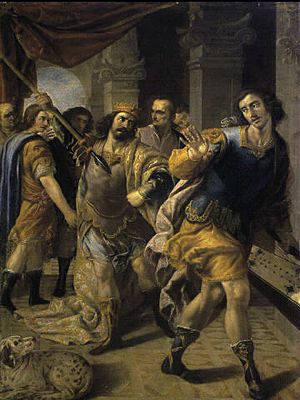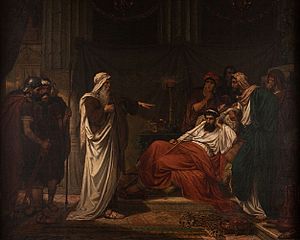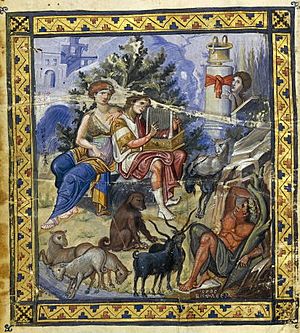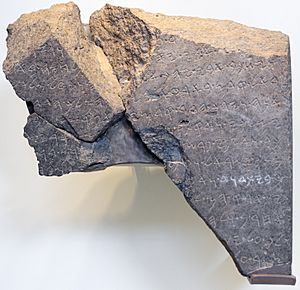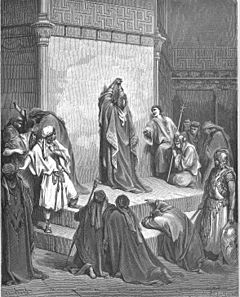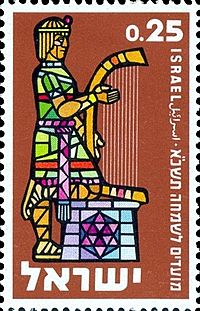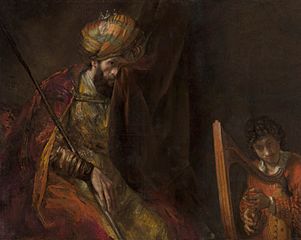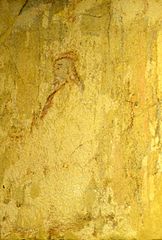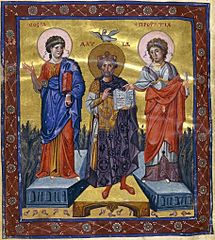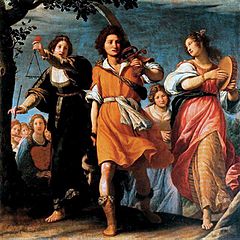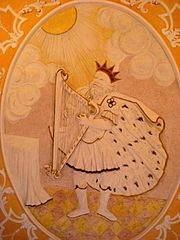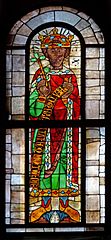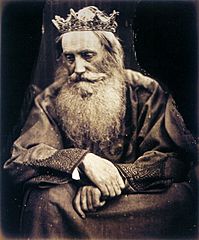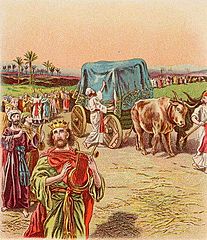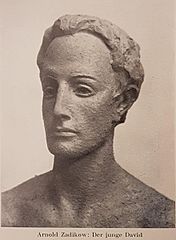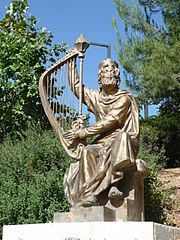David facts for kids
Quick facts for kids Davidדָּוִד |
|
|---|---|
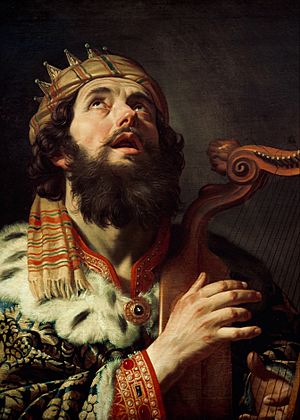
King David Playing the Harp (1622)
by Gerard van Honthorst |
|
| King of Israel | |
| Predecessor | Ish-bosheth |
| Successor | Solomon |
| Consort | |
| Issue | |
| House | House of David |
| Father | Jesse |
| Mother | Nitzevet (Talmud) |
David ( Biblical Hebrew: דָּוִד, romanized: Dāwīḏ, "beloved one") was, according to the Hebrew Bible, the third king of the United Kingdom of Israel. Historians of the Ancient Near East agree that David probably lived around 1000 BCE, but little more is known about him as a historical figure.
According to Jewish works such as the Seder Olam Rabbah, Seder Olam Zutta, and Sefer ha-Qabbalah, David ascended the throne as the king of Judah in 885 BCE. The Tel Dan stele, an Aramaic-inscribed stone that was erected by a king of Aram-Damascus in the late-9th/early-8th centuries BCE to commemorate a victory over two enemy kings, contains the phrase bytdwd (𐤁𐤉𐤕𐤃𐤅𐤃), which is translated to "House of David" by most scholars. The Mesha stele, erected by king Mesha of Moab in the 9th century BCE, may also refer to the "House of David", although this is disputed. Apart from this, all that is known of David comes from biblical literature, the historicity of which has been extensively challenged, and there is little detail about David that is concrete and undisputed.
In the biblical narrative of the Books of Samuel, David is described as a young shepherd and harpist who gains fame by killing Goliath. He becomes a favorite of Saul, the first king of Israel, but is forced to go into hiding when Saul becomes paranoid that David is trying to take his throne. After Saul and his son Jonathan are killed in battle, David is anointed king by the tribe of Judah and eventually all the tribes of Israel. He conquers Jerusalem, makes it the capital of a united Israel and brings the Ark of the Covenant to the city. He falls in love with Bathsheba and arranges the death of her husband, Uriah the Hittite. David's son Absalom later tries to overthrow him, but David returns to Jerusalem after Absalom's death to continue his reign. David desires to build a temple to Yahweh but is denied because of the bloodshed in his reign. He dies at age 70 and chooses Solomon, his son with Bathsheba, as his successor instead of his eldest son Adonijah. David is honored as an ideal king and the forefather of the future Hebrew Messiah in Jewish prophetic literature and many psalms are attributed to him.
David is also richly represented in post-biblical Jewish written and oral tradition and referenced in the New Testament. Early Christians interpreted the life of Jesus of Nazareth in light of references to the Hebrew Messiah and to David; Jesus is described as being directly descended from David in the Gospel of Matthew and the Gospel of Luke. In the Quran and hadith, David is described as an Israelite king as well as a prophet of Allah. The biblical David has inspired many interpretations in art and literature over the centuries.
Contents
Biblical account
Family
The First Book of Samuel and the First Book of Chronicles both identify David as the son of Jesse, the Bethlehemite, the youngest of eight sons. He also had at least two sisters, Zeruiah, whose sons all went on to serve in David's army, and Abigail, whose son Amasa went on to serve in Absalom's army, Absalom being one of David's younger sons. While the Bible does not name his mother, the Talmud identifies her as Nitzevet, a daughter of a man named Adael, and the Book of Ruth claims him as the great-grandson of Ruth, the Moabite, by Boaz.
David is described as cementing his relations with various political and national groups through marriage. In 1 Samuel 17:25, it states that King Saul had said that he would make whoever killed Goliath a very wealthy man, give his daughter to him and declare his father's family exempt from taxes in Israel. Saul offered David his oldest daughter, Merab, a marriage which David respectfully declined. Saul then gave Merab in marriage to Adriel the Meholathite. Having been told that his younger daughter Michal was in love with David, Saul gave her in marriage to David. Saul then became jealous of David and tried to have him killed. David escaped. Then Saul sent Michal to Galim to marry Palti, son of Laish. David then took wives in Hebron, according to 2 Samuel 3; they were Ahinoam the Yizre'elite; Abigail, the wife of Nabal the Carmelite; Maacah, the daughter of Talmay, king of Geshur; Haggith; Abital; and Eglah. Later, David wanted Michal back and Abner, Ish-bosheth's army commander, delivered her to David, causing her husband (Palti) great grief.
The Book of Chronicles lists his sons with his various wives. In Hebron, David had six sons: Amnon, by Ahinoam; Daniel, by Abigail; Absalom, by Maachah; Adonijah, by Haggith; Shephatiah, by Abital; and Ithream, by Eglah. By Bathsheba, his sons were Shammua, Shobab, Nathan, and Solomon. David's sons born in Jerusalem of his other wives included Ibhar, Elishua, Eliphelet, Nogah, Nepheg, Japhia, Elishama and Eliada. Jerimoth, who is not mentioned in any of the genealogies, is mentioned as another of his sons in 2 Chronicles 11:18.
Narrative
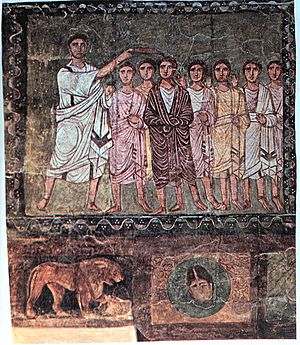
God is angered when Saul, Israel's king, unlawfully offers a sacrifice and later disobeys a divine command both to kill all of the Amalekites and to destroy their confiscated property. Consequently, God sends the prophet Samuel to anoint a shepherd, David, the youngest son of Jesse of Bethlehem, to be king instead.
After God sends an evil spirit to torment Saul, his servants recommend that he send for a man skilled in playing the lyre. A servant proposes David, whom the servant describes as "skillful in playing, a man of valor, a warrior, prudent in speech, and a man of good presence; and the Lord is with him." David enters Saul's service as one of the royal armour-bearers and plays the lyre to soothe the king.
War comes between Israel and the Philistines, and the giant Goliath challenges the Israelites to send out a champion to face him in single combat. David, sent by his father to bring provisions to his brothers serving in Saul's army, declares that he can defeat Goliath. Refusing the king's offer of the royal armour, he kills Goliath with his sling. Saul inquires the name of the young hero's father.
Saul sets David over his army. All Israel loves David, but his popularity causes Saul to fear him ("What else can he wish but the kingdom?"). Saul plots his death, but Saul's son Jonathan, one of those who loves David, warns him of his father's schemes and David flees. He goes first to Nob, where he is fed by the priest Ahimelech and given Goliath's sword, and then to Gath, the Philistine city of Goliath, intending to seek refuge with King Achish there. Achish's servants or officials question his loyalty, and David sees that he is in danger there. He goes next to the cave of Adullam, where his family joins him. From there he goes to seek refuge with the king of Moab, but the prophet Gad advises him to leave and he goes to the Forest of Hereth, and then to Keilah, where he is involved in a further battle with the Philistines. Saul plans to besiege Keilah so that he can capture David, so David leaves the city in order to protect its inhabitants. From there he takes refuge in the mountainous Wilderness of Ziph.
Jonathan meets with David again and confirms his loyalty to David as the future king. After the people of Ziph notify Saul that David is taking refuge in their territory, Saul seeks confirmation and plans to capture David in the Wilderness of Maon, but his attention is diverted by a renewed Philistine invasion and David is able to secure some respite at Ein Gedi. Returning from battle with the Philistines, Saul heads to Ein Gedi in pursuit of David and enters the cave where, as it happens, David and his supporters are hiding. David realises he has an opportunity to kill Saul, but this is not his intention: he secretly cuts off a corner of Saul's robe, and when Saul has left the cave he comes out to pay homage to Saul as the king and to demonstrate, using the piece of robe, that he holds no malice towards Saul. The two are thus reconciled and Saul recognises David as his successor.
A similar passage occurs in 1 Samuel 26, when David is able to infiltrate Saul's camp on the hill of Hachilah and remove his spear and a jug of water from his side while he and his guards lie asleep. In this account, David is advised by Abishai that this is his opportunity to kill Saul, but David declines, saying he will not "stretch out [his] hand against the Lord's anointed". Saul confesses that he has been wrong to pursue David and blesses him.
In 1 Samuel 27:1–4, Saul ceases to pursue David because David took refuge a second time with Achish, the Philistine king of Gath. Achish permits David to reside in Ziklag, close to the border between Gath and Judea, from where he leads raids against the Geshurites, the Girzites and the Amalekites, but leads Achish to believe he is attacking the Israelites in Judah, the Jerahmeelites and the Kenites. Achish believes that David had become a loyal vassal, but he never wins the trust of the princes or lords of Gath, and at their request Achish instructs David to remain behind to guard the camp when the Philistines march against Saul. David returns to Ziklag and saves his wives and the citizens from the Amalekites. Jonathan and Saul are killed in battle, and David is anointed king over Judah. In the north, Saul's son Ish-Bosheth is anointed king of Israel, and war ensues until Ish-Bosheth is murdered.
With the death of Saul's son, the elders of Israel come to Hebron and David is anointed king over all of Israel. He conquers Jerusalem, previously a Jebusite stronghold, and makes it his capital. He brings the Ark of the Covenant to the city, intending to build a temple for God, but the prophet Nathan forbids it, prophesying that the temple would be built by one of David's sons. Nathan also prophesies that God has made a covenant with the house of David stating, "your throne shall be established forever". David wins additional victories over the Philistines, Moabites, Edomites, Amalekites, Ammonites and king Hadadezer of Aram-Zobah, after which they become tributaries. His fame increase as a result, earning the praise of figures like king Toi of Hamath, Hadadezer's rival.
During a siege of the Ammonite capital of Rabbah, David remains in Jerusalem. He sees a woman, Bathsheba and falls in love with her. David conspireds to have Uriah the Hittite, Bathsheba's husband, killed in the heat of battle. David then marries the widowed Bathsheba. When David acknowledges that he has sinned, Nathan tells him that his sin is forgiven and he will not die, but his and Bathsheba's child will. In fulfillment of Nathan's words, the child born of the union between David and Bathsheba dies, and another of David's sons, Absalom, fueled by vengeance and lust for power, rebels. Thanks to Hushai, a friend of David who was ordered to infiltrate Absalom's court to successfully sabotage his plans, Absalom's forces are routed at the battle of the Wood of Ephraim, and he is caught by his long hair in the branches of a tree where, contrary to David's order, he is killed by Joab, the commander of David's army. David laments the death of his favourite son: "O my son Absalom, my son, my son Absalom! Would I had died instead of you, O Absalom, my son, my son!" until Joab persuades him to recover from "the extravagance of his grief" and to fulfill his duty to his people. David returns to Gilgal and is escorted across the River Jordan and back to Jerusalem by the tribes of Judah and Benjamin.
When David is old and bedridden, Adonijah, his eldest surviving son and natural heir, declares himself king. Bathsheba and Nathan go to David and obtain his agreement to crown Bathsheba's son Solomon as king, according to David's earlier promise, and the revolt of Adonijah is put down. David dies at the age of 70 after reigning for 40 years, and on his deathbed counsels Solomon to walk in the ways of God and to take revenge on his enemies.
Psalms
The Book of Samuel calls David a skillful harp (lyre) player and "the sweet psalmist of Israel." Yet, while almost half of the Psalms are headed "A Psalm of David" (also translated as "to David" or "for David") and tradition identifies several with specific events in David's life (e.g., Psalms 3, 7, 18, 34, 51, 52, 54, 56, 57, 59, 60, 63 and 142), the headings are late additions and no psalm can be attributed to David with certainty.
Historicity
Archaeological findings
The Tel Dan Stele, discovered in 1993, is an inscribed stone erected by Hazael, a king of Damascus in the late 9th/early 8th centuries BCE. It commemorates the king's victory over two enemy kings, and contains the phrase 𐤁𐤉𐤕𐤃𐤅𐤃, bytdwd, which most scholars translate as "House of David". Other scholars have challenged this reading, but it is likely that this is a reference to a dynasty of the Kingdom of Judah which traced its ancestry to a founder named David.
Two epigraphers, André Lemaire and Émile Puech, hypothesised in 1994 that the Mesha Stele from Moab, dating from the 9th century, also contain the words "House of David" at the end of Line 31, although this was considered as less certain than the mention in the Tel Dan inscription. In May 2019, Israel Finkelstein, Nadav Na'aman, and Thomas Römer concluded from the new images that the ruler's name contained three consonants and started with a bet, which excludes the reading "House of David" and, in conjunction with the monarch's city of residence "Horonaim" in Moab, makes it likely that the one mentioned is King Balak, a name also known from the Hebrew Bible. Later that year, Michael Langlois used high-resolution photographs of both the inscription itself, and the 19th-century original squeeze of the then still intact stele to reaffirm Lemaire's view that line 31 contains the phrase "House of David". Replying to Langlois, Na'aman argued that the "House of David" reading is unacceptable because the resulting sentence structure is extremely rare in West Semitic royal inscriptions.
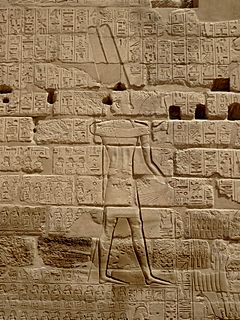
Besides the two steles, Bible scholar and Egyptologist Kenneth Kitchen suggests that David's name also appears in a relief of Pharaoh Shoshenq, who is usually identified with Shishak in the Bible. The relief claims that Shoshenq raided places in Palestine in 925 BCE, and Kitchen interprets one place as "Heights of David", which was in Southern Judah and the Negev where the Bible says David took refuge from Saul. The relief is damaged and interpretation is uncertain.
Art and literature
Literature
Literary works about David include:
- 1517 The Davidiad is a Neo-Latin epic poem by the Croatian national poet, Roman Catholic priest, and Renaissance humanist Marko Marulić (whose name is sometimes Latinized as "Marcus Marulus"). In addition to the small portions that attempt to recall the epics of Homer, The Davidiad is heavily modeled upon Virgil's Aeneid. This is so much the case that Marulić's contemporaries called him the "Christian Virgil from Split." The philologist Miroslav Marcovich also detects, "the influence of Ovid, Lucan, and Statius" in the work.
- 1681–82 Dryden's long poem Absalom and Achitophel is an allegory that uses the story of the rebellion of Absalom against King David as the basis for his satire of the contemporary political situation, including events such as the Monmouth Rebellion (1685), the Popish Plot (1678) and the Exclusion Crisis.
- 1893 Sir Arthur Conan Doyle may have used the story of David and Bathsheba as a foundation for the Sherlock Holmes story The Adventure of the Crooked Man. Holmes mentions "the small affair of Uriah and Bathsheba" at the end of the story.
- 1928 Elmer Davis's novel Giant Killer retells and embellishes the biblical story of David.
- 1936 William Faulkner's Absalom, Absalom! refers to the story of Absalom, David's son; his rebellion against his father and his death at the hands of David's general, Joab.
- 1946 Gladys Schmitt's novel David the King was a richly embellished biography of David's entire life.
- 1966 Juan Bosch, a Dominican political leader and writer, wrote David: Biography of a King, as a realistic portrayal of David's life and political career.
- 1972 Stefan Heym wrote The King David Report in which the historian Ethan compiles upon King Solomon's orders "a true and authoritative report on the life of David, Son of Jesse"—the East German writer's wry depiction of a court historian writing an "authorized" history, many incidents clearly intended as satirical references to the writer's own time.
- 1974 In Thomas Burnett Swann's biblical fantasy novel How are the Mighty Fallen, David and Jonathan are explicitly stated to be lovers. Moreover, Jonathan is a member of a winged semi-human race (possibly nephilim), one of several such races coexisting with humanity but often persecuted by it.
- 1980 Malachi Martin's factional novel King of Kings: A Novel of the Life of David relates the life of David, Adonai's champion in his battle with the Philistine deity Dagon.
- 1984 Joseph Heller wrote a novel based on David called God Knows, published by Simon & Schuster. Told from the perspective of an aging David, the humanity—rather than the heroism—of various biblical characters is emphasized. The portrayal of David as a man of flaws such as greed, selfishness, and his alienation from God, the falling apart of his family is a distinctly 20th-century interpretation of the events told in the Bible.
- 1993 Madeleine L'Engle's novel Certain Women explores family, the Christian faith, and the nature of God through the story of King David's family and an analogous modern family's saga.
- 1995 Allan Massie wrote King David, a novel about David's career.
- 2015 Geraldine Brooks wrote a novel about King David, The Secret Chord, told from the point of view of the prophet Nathan.
- 2020 Michael Arditti wrote The Anointed, a novel about King David, told by three of his wives, Michal, Abigail and Bathsheba.
Paintings
- 1599 Caravaggio David and Goliath
- c. 1610 Caravaggio David with the Head of Goliath
- 1616 Peter Paul Rubens David Slaying Goliath
- c. 1619 Caravaggio, David and Goliath
Sculptures
- 1440? Donatello, David
- 1473–1475 Verrocchio, David
- 1501–1504 Michelangelo, David
- 1623–1624 Gian Lorenzo Bernini, David
Film
David has been depicted several times in films; these are some of the best-known:
- 1951 In David and Bathsheba, directed by Henry King, Gregory Peck played David.
- 1959 In Solomon and Sheba, directed by King Vidor, Finlay Currie played an aged King David.
- 1961 In A Story of David, directed by Bob McNaught, Jeff Chandler played David.
- 1985 In King David, directed by Bruce Beresford, Richard Gere played King David.
- 1996 In Dave and the Giant Pickle
Television
- 1976 The Story of David, a made-for-TV film with Timothy Bottoms and Keith Michell as King David at different ages.
- 1997 David, a TV-film with Nathaniel Parker as King David and Leonard Nimoy as the Prophet Samuel.
- 1997 Max von Sydow portrayed an older King David in the TV-film Solomon, a sequel to David.
- 2009 Christopher Egan played David on Kings, a re-imagining loosely based on the biblical story.
- King David is the focus of the second episode of History Channel's Battles BC documentary, which detailed all of his military exploits in the bible.
- 2012 Rei Davi, a Brazilian miniseries with Leonardo Brício as David.
- 2013 Langley Kirkwood portrayed King David in the miniseries The Bible.
- 2016 Of Kings and Prophets in which David is played by Olly Rix
Music
- The traditional birthday song Las Mañanitas mentions King David as the original singer in its lyrics.
- 1622 Thomas Tomkins's choral anthem "When David Heard", about David's response to the death of his son Absalom, is published in the anthology Songs of 1622.
- 1738 George Frideric Handel's oratorio Saul features David as one of its main characters.
- 1921 Arthur Honegger's oratorio Le Roi David with a libretto by René Morax, instantly became a staple of the choral repertoire.
- 1954 Darius Milhaud's opera David premieres in Jerusalem in celebration of the 3,000th anniversary of the establishment of that city by David.
- 1964 Bob Dylan alludes to David in the last line of his song "When The Ship Comes In" ("And like Goliath, they'll be conquered").
- 1965 Leonard Bernstein described the second movement of his Chichester Psalms, which features a setting of Psalm 23, sung by a boy soloist accompanied by a harp, as a "musical evocation of King David, the shepherd-psalmist".
- 1983 Bob Dylan refers to David in his song "Jokerman" ("Michelangelo indeed could've carved out your features").
- 1984 Leonard Cohen's song "Hallelujah" has references to David ("there was a secret chord that David played and it pleased the Lord", "The baffled king composing Hallelujah") and Bathsheba ("you saw her bathing on the roof") in its opening verses.
- 1990 The song "One of the Broken" by Paddy McAloon, performed by Prefab Sprout on the album Jordan: The Comeback, has a reference to David ("I remember King David, with his harp and his beautiful, beautiful songs, I answered his prayers, and showed him a place where his music belongs").
- 1991 "Mad About You", a song on Sting's album The Soul Cages, explores David's obsession with Bathsheba from David's perspective.
- 2000 The song "Gimme a Stone" appears on the Little Feat album Chinese Work Songs chronicles the duel with Goliath and contains a lament to Absalom as a bridge.
Musical theater
- 1997 King David, sometimes described as a modern oratorio, with a book and lyrics by Tim Rice and music by Alan Menken.
Playing cards
For a considerable period, starting in the 15th century and continuing until the 19th, French playing card manufacturers assigned to each of the court cards names taken from history or mythology. In this context, the King of spades was often known as "David".
Image gallery
-
Rembrandt, c. 1650: Saul and David.
-
Mural of King David from an 18th-century sukkah (Jewish Museum of Franconia).
-
King David, stained glass windows from the Romanesque Augsburg Cathedral, late 11th century.
-
Study of King David, by Julia Margaret Cameron. Depicts Sir Henry Taylor, 1866.
-
King David Monument on Mount Zion
See also
 In Spanish: David para niños
In Spanish: David para niños
- David and Jonathan
- David's Mighty Warriors
- David's Tomb
- City of David
- Tower of David
- Kings of Israel and Judah
- Large Stone Structure
- Midrash Shmuel (aggadah)
- Sons of David


